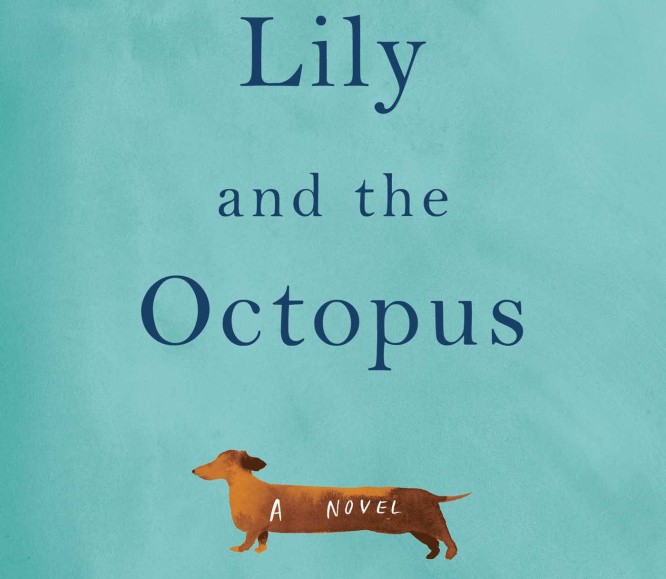Every dog owner has a dog story or 500 to tell. Typically these are doled out in three-minute increments to fellow pet people at the dog park, who are always game to listen (as long as they get their turn) or on the sidewalk to anyone who stops and expresses even a mild interest in whoever is at the end of the dog owner’s leash. Having a dog often means having a running narrative in one’s head about the dog, whether it is about the animals imagined inner life or perhaps his or her undying devotion to the owner.
Steven Rowley’s novel “Lily and the Octopus” is a 320-page dog story about an owner’s devotion to his animal, complete with magical realism and various all-capped renderings of the thoughts of a dachshund named Lily, which run to the ecstatic. Here she is licking tears off her own highly emotional owner Ted Flask’s face: “THIS! EYE! RAIN! YOU! MAKE! IS! FANTASTIC!”
If you are a cat person the proceeding likely made you immediately cross “Lily and the Octopus” off your must-read list. Probably a good idea. Even I, a serious dog lover with a tendency to narrate my dog’s every puzzled look, got worried that I was entering the danger zone of cutsie dog stories.
My fears proved true. Ted would be exactly the neurotic kind of owner who fusses over his dog and makes me take abrupt turns down other paths if encountered on a walk. Twelve-year-old Lily has a tumor on her head, although Ted, who is 42, or 294 in dog years, as he tells us on page 1 of this bludgeoningly sentimental novel, prefers to call it an “octopus.” He’s a pop culture maven from Maine who lives in Los Angeles and also manages to mention Ryan Gosling and Ryan Reynolds on that first page. (Rowley grew up in South Portland and has made a living as a screenwriter in Los Angeles.)
Ted refuses to call the cancer a cancer, although he realizes the octopus intends to consume sweet Lily. Over martinis and Valium, he tells his best friend Trent – himself an “octopus” survivor – “It cannot have her.” When Ted, who is burdened by sorrow over breaking up with his unfaithful long-term lover, Jeffrey, finally tells his therapist about Lily’s illness, he is again insistent on calling the cancer an octopus. Understandably, she’s confused, then uncertain and, finally, pitying.
Yet, Ted is nothing if not self-aware, wondering to himself as he sits in therapy, “Maybe I, too, am suffering impairment from the presence of the octopus, seizures in reason. My thoughts of late have resembled those of a small child more than the thinking of a grown man: the magical rationalization of needing to be gone so the octopus can leave; my desire to be intimidating, bigger than I am, to have the hurricane in me; the need to express everything in a tantrum.”
Tantrum. It’s just the right word, because there are many ways in which “Lily and the Octopus” is like observing an exhausting tantrum. Ted makes various forays against the octopus, purchasing six large inflatable sharks (pool toys), blowing them up and placing them around his backyard to prey on the octopus. He buys an octopus in Chinatown, hacks it up with a cleaver and feeds pieces of it to Lily. In a tedious overly long sequence he and Lily go to sea in a boat called Fishful Thinking, hunting octopus. Maybe it’s meant to be a scotch-fueled hallucination or a “Life of Pi”-style puzzle, but mostly, it comes across as writerly over-indulgence.
Rowley does supply some moving emotional rationale for Ted’s behaviors and fantasies. Ted believes that some bad kharma has earned him the impending death of his dog (never mind that she’s 12) and comes to the revelation that he is both “driven more by revenge than by forgiveness” and suffering from a deep self-loathing. The connection Rowley makes between this last and Ted’s early life as a closeted gay man are thought-provoking. Even more so is the question he raises about the ways in which dog owners, in their devotion to these beings who are so much easier to deal with than the average human, become emotionally withdrawn from the rest of the world, developing something called Enclosed World Syndrome.
But this emotional breakthrough doesn’t feel earned through an organic evolution. Instead the whole octopus business comes across as a coy device, simply the means by which the writer stalls the inevitable breakthrough and death scene with enough padding to make it a book.
Journeys of farewells and grieving take all sorts of shapes, of course, and they appeal in different ways to different people. Simon & Schuster’s reportedly large advance for Rowley’s novel suggests that his publisher sees the potential for a “Marley & Me”-sized reception. One person’s cloying is another person’s successful tearjerker. Undeniably, Rowley practically makes you see Lily (“her ears flop back and forth and the familiar chime of her collar and dog tags jingle the room alive”). She’s a dear little dog. But I liked her enough to picture her saying, “ENOUGH! WITH! THE! OCTOPUS! SHTICK!”
Copy the Story LinkSend questions/comments to the editors.





Success. Please wait for the page to reload. If the page does not reload within 5 seconds, please refresh the page.
Enter your email and password to access comments.
Hi, to comment on stories you must . This profile is in addition to your subscription and website login.
Already have a commenting profile? .
Invalid username/password.
Please check your email to confirm and complete your registration.
Only subscribers are eligible to post comments. Please subscribe or login first for digital access. Here’s why.
Use the form below to reset your password. When you've submitted your account email, we will send an email with a reset code.